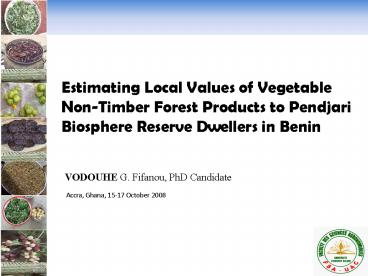Diapositive 1 - PowerPoint PPT Presentation
1 / 17
Title:
Diapositive 1
Description:
Determinism of values assigned to species by PBR surrounding people ... Although PBR people have access to a wide range of species, results found that ... – PowerPoint PPT presentation
Number of Views:22
Avg rating:3.0/5.0
Title: Diapositive 1
1
Estimating Local Values of Vegetable Non-Timber
Forest Products to Pendjari Biosphere Reserve
Dwellers in Benin
VODOUHE G. Fifanou, PhD Candidate
Accra, Ghana, 15-17 October 2008
2
Context of the study
Conservation and sustainable resource use will
not be successful without the full participation
of indigenous people and the application of their
ethnobotanical and ecological knowledge
(Gemedo-Dalle et al., 2005)
3
Context of the study
That's absolutely true in Africa where people
depend on natural resources for their livelihood
for centuries (Gemedo-Dalle et al., 2005 Törn et
al., 2008)
4
Context of the study
For many authors, the non consideration of this
reality is the reason of the failures of many
efforts undertaken to conserve biodiversity in
developing countries
(Gopalakrishnan et al., 2005 Gemedo-Dalle et
al., 2005 Törn et al., 2008)
5
Need for information
This integration of people need in conservation
program cant be done without good understanding
of links between useful plants and local people
6
Study area
- North West of Rep of Benin (1030 to 1130 N
050 to 200 E) - Area 281,359ha
- Pop 30,000 inhabitants
- NPP was upgraded Biosphere Reserve in 1986
7
Objective
This study aimed at felling this gap of
information and will permit better understanding
of the use-values of plants for people living
around the PBR and the socio-economic and
contextual factors that may influence these
values.
8
Methods
- Data were collected from individual using
questionnaires - 186 respondents (105 men and 80 women) make up
the research sample - Respondents were asked to rank by importance the
10 most important species that they had harvested
over the last 5 years - Data were analyzed using the Linear Mixed Model
and descriptive statistics
9
Effect of use on species values
Value of species used per category of use
- Values assigned to species by respondents vary
according to the type of use
10
Effect of socio-economic factors on species values
Linear mixed model analysis of variance summary
Importance accorded to species was significantly
affected by factors such as type of species,
gender/species and the socio-cultural
group/species of the respondent
11
Most valued species in PBR
- Most valued botanic families are Bombacaceae,
Mimosaceae and Sapotaceae
- PBR people value trees more than herbaceous
species (Student t test, d.f. 67, P0.001)
12
Gender effect on species values
- We consider gender at the level of relation
between men and women because its the more
striking gender aspect in the study area - Women valued species used for food more than men
whose interest relates to species used as
construction material and medicine
13
Socio-cultural groups and species values
Linear Mixed Model, F4.33 Plt0.001
- People from historically hunters groups valued
more useful species than any other
socio-cultural groups
- Land availability is the 2nd reason which
explain the difference in values accorded to
species by socio-cultural groups
14
Determinism of values assigned to species by PBR
surrounding people
- Variation in values attributed to species could
be explained by the transmission of
ethnobotanical knowledge in the PBR communities
- PBR people acquired, learned and
taught species use by doing - The species knowledge is transmitted vertically
through family dissemination
15
Conclusions
- Although PBR people have access to a wide range
of species, results found that only a few species
are highly valued. - NTFPs are used in a wide range of categories,
which indicates the close links between
livelihoods and natural resources in the area.
- Women have at least as much diversity of
knowledge as men and show that they are also
important stakeholders and merit consideration in
reserve biodiversity conservation management. - Biodiversity conservation strategies will
successfully teach to people using learning by
doing strategy and focused on the most important
species used in the area.
16
Acknowledgments
17
THANK YOU































